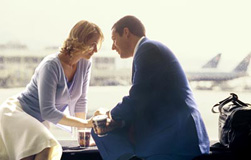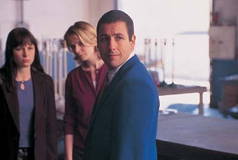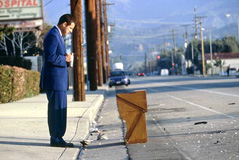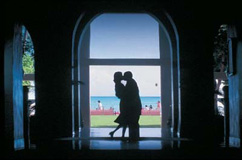Punch-Drunk Love (Paul Thomas Anderson) 2002
 Paul Thomas Andersonís decision to cast comic Adam Sandler
in the lead role of his new film Punch-Drunk Love combined with the
filmís ninety minute runtime and superficially lighter subject matter make it
seem a deliberate attempt by the director to distance himself from the cries of
excess that greeted the release of his last film, the magnificent Magnolia.
If distance from Magnolia was Anderson's goal, heís failed on many
levels. Much to my surprise, the two films share many of the same elements, such as the
incessant, effectively repetitive, clanging Jon Brion score, the occasional
elegant tracking shot that does wonders in convincing the viewer that the movie takes place in an actual environment, a highly pitched sense of emotional
intensity, and the feeling that just about anything could wander into the frame
next. Beyond that, though, Punch-Drunk Love is by any definition an
unusual, almost indefinable movie: itís probably the oddest that will come out
of Hollywood this year. I doubt any amount of description could quite prepare a
viewer for it, because thereís been nothing before thatís quite like it. Think
of a fusion of a violent, razorís edge (but not black) comedy like Demmeís Something
Wild or Scorseseís After Hours and a Jacque Tati film like Mon
Oncle and you might come close to approximating the sophisticated humor that
the film packs. It isnít much interested earning our laughs in any conformist
way. When Sandlerís character Barry Egan tells his girlfriend Lena (Emily
Watson) a conventional joke at a restaurant, Anderson cuts to it only in time to
hear the punch line, so we know that a joke was told, but effectively cutting
all humor from such a straightforward opportunity for a gag (which makes it feel
a bit odd on those rare occasions when it does go for one). It's almost as if
the director is reassuring the audience that he's not after typical jests,
just in case we were doubting his intentions. Quite fortunately
for those, like myself, who are rabid fans of the director, this brilliant film
contains plenty of laughs elsewhere. Itís so startlingly packed with visual
invention, technical bravura, and desperate pathos that its brief running time
speeds by almost too quickly.
Paul Thomas Andersonís decision to cast comic Adam Sandler
in the lead role of his new film Punch-Drunk Love combined with the
filmís ninety minute runtime and superficially lighter subject matter make it
seem a deliberate attempt by the director to distance himself from the cries of
excess that greeted the release of his last film, the magnificent Magnolia.
If distance from Magnolia was Anderson's goal, heís failed on many
levels. Much to my surprise, the two films share many of the same elements, such as the
incessant, effectively repetitive, clanging Jon Brion score, the occasional
elegant tracking shot that does wonders in convincing the viewer that the movie takes place in an actual environment, a highly pitched sense of emotional
intensity, and the feeling that just about anything could wander into the frame
next. Beyond that, though, Punch-Drunk Love is by any definition an
unusual, almost indefinable movie: itís probably the oddest that will come out
of Hollywood this year. I doubt any amount of description could quite prepare a
viewer for it, because thereís been nothing before thatís quite like it. Think
of a fusion of a violent, razorís edge (but not black) comedy like Demmeís Something
Wild or Scorseseís After Hours and a Jacque Tati film like Mon
Oncle and you might come close to approximating the sophisticated humor that
the film packs. It isnít much interested earning our laughs in any conformist
way. When Sandlerís character Barry Egan tells his girlfriend Lena (Emily
Watson) a conventional joke at a restaurant, Anderson cuts to it only in time to
hear the punch line, so we know that a joke was told, but effectively cutting
all humor from such a straightforward opportunity for a gag (which makes it feel
a bit odd on those rare occasions when it does go for one). It's almost as if
the director is reassuring the audience that he's not after typical jests,
just in case we were doubting his intentions. Quite fortunately
for those, like myself, who are rabid fans of the director, this brilliant film
contains plenty of laughs elsewhere. Itís so startlingly packed with visual
invention, technical bravura, and desperate pathos that its brief running time
speeds by almost too quickly.
 Telling the romantic tale of one
Barry Egan, a hardworking but socially awkward novelty item salesman, Anderson
essentially examines the wonderful and frightening way that love makes us
re-evaluate our self-worth. From a series of knowingly quirky incidents, he
creates a symphonic and stressful frenzy of emotions that conflict and finally
congeal into something resembling the filmís oddball title. Because of his
gauche screen presence, Sandler is well cast as Egan, who is best described as a
wounded puppy dog that sometimes snaps at those who rile him up. In lieu of a
typical title sequence, the film offers a multicolored Rorschach blot that must
approximate the ebb and flow of Barryís volatile emotions, and when that flow
of colors in approximated later in a key dialogue sequence, the effect has
stunning emotional impact. One of the best sequences in the film uses a long
tracking shot show us the accumulation of Barryís tension until it boils over,
and the aforementioned score grates on our nerves, while retaining some of the
beauty of the world that surrounds the protagonist. As a result of its emotional
instability, the film retains an air of wild unpredictability even as it roughly
follows generic conventions and we can completely sympathize with his impulsive
feelings, even if his inability to control those pathological urges makes him
seem rash, and a bit insane. All of Andersonís Magnolia could be seen
as an escalation of tension leading up to an epic narrative explosion that
utterly shifted the world that the film took place in. Here the ebb and flow of
rage and calm comes far more frequently, but each explosive incident feels like
a major climax and packs a punch.
Telling the romantic tale of one
Barry Egan, a hardworking but socially awkward novelty item salesman, Anderson
essentially examines the wonderful and frightening way that love makes us
re-evaluate our self-worth. From a series of knowingly quirky incidents, he
creates a symphonic and stressful frenzy of emotions that conflict and finally
congeal into something resembling the filmís oddball title. Because of his
gauche screen presence, Sandler is well cast as Egan, who is best described as a
wounded puppy dog that sometimes snaps at those who rile him up. In lieu of a
typical title sequence, the film offers a multicolored Rorschach blot that must
approximate the ebb and flow of Barryís volatile emotions, and when that flow
of colors in approximated later in a key dialogue sequence, the effect has
stunning emotional impact. One of the best sequences in the film uses a long
tracking shot show us the accumulation of Barryís tension until it boils over,
and the aforementioned score grates on our nerves, while retaining some of the
beauty of the world that surrounds the protagonist. As a result of its emotional
instability, the film retains an air of wild unpredictability even as it roughly
follows generic conventions and we can completely sympathize with his impulsive
feelings, even if his inability to control those pathological urges makes him
seem rash, and a bit insane. All of Andersonís Magnolia could be seen
as an escalation of tension leading up to an epic narrative explosion that
utterly shifted the world that the film took place in. Here the ebb and flow of
rage and calm comes far more frequently, but each explosive incident feels like
a major climax and packs a punch.
 The visual scheme of the movie is probably Punch-Drunk
Loveís greatest strength, but that doesnít mean that Punch-Drunk Love
is an empty exercise in aesthetics. Though Anderson is sure to be accused of
ripping off Tatiís style by his detractors, since many of his jokes rely on
the physical exploitation of his widescreen frame and the space that surrounds
it, Punch is far more plot-bound than anything that Tati ever did, and
Tati was never fortunate enough to have to have luxuries like Steadicam and
digital effects to enhance his vision. Anderson perhaps one-ups Tatis, since he uses his sight gags to enhance our understandings of his characterís emotions
as well as make us laugh. Before Barry places a call to a phone sex line, we see
him close his shades, even though he then proceeds to a room without windows,
and thereís no better way for us to grasp his nervous shame at that moment.
Perhaps more than anything, Punch-Drunk Love is a product of its
environment. Countless films have been set in Los Angeles, but I donít think
one exists that so perfectly captures the feel of the valley. The aggressively
bland non-look that the city has feels totally unique in Andersonís hands.
Flat paint, poor city planning, smoggy skies, lens flair, and deliberately
muddied lighting combine to form an aesthetic thatís undeniably his own. The
directorís experiments with color, light, and darkness are incredibly
sophisticated, and when his characters finally turn into the shadow puppets that
theyíve been hinting theyíd become all along, the effect is breathtaking.
Some shots, such as the ones where a character walks down a spartan hallway,
slowly losing color as he descends further away from the camera, are equally
rapturous.
The visual scheme of the movie is probably Punch-Drunk
Loveís greatest strength, but that doesnít mean that Punch-Drunk Love
is an empty exercise in aesthetics. Though Anderson is sure to be accused of
ripping off Tatiís style by his detractors, since many of his jokes rely on
the physical exploitation of his widescreen frame and the space that surrounds
it, Punch is far more plot-bound than anything that Tati ever did, and
Tati was never fortunate enough to have to have luxuries like Steadicam and
digital effects to enhance his vision. Anderson perhaps one-ups Tatis, since he uses his sight gags to enhance our understandings of his characterís emotions
as well as make us laugh. Before Barry places a call to a phone sex line, we see
him close his shades, even though he then proceeds to a room without windows,
and thereís no better way for us to grasp his nervous shame at that moment.
Perhaps more than anything, Punch-Drunk Love is a product of its
environment. Countless films have been set in Los Angeles, but I donít think
one exists that so perfectly captures the feel of the valley. The aggressively
bland non-look that the city has feels totally unique in Andersonís hands.
Flat paint, poor city planning, smoggy skies, lens flair, and deliberately
muddied lighting combine to form an aesthetic thatís undeniably his own. The
directorís experiments with color, light, and darkness are incredibly
sophisticated, and when his characters finally turn into the shadow puppets that
theyíve been hinting theyíd become all along, the effect is breathtaking.
Some shots, such as the ones where a character walks down a spartan hallway,
slowly losing color as he descends further away from the camera, are equally
rapturous.
 Some who have preconceived
notions about what an Adam Sandler film must do might be disappointed by Punch-Drunk
Love. Many of the quirkier aspects of the film never develop as we might
suspect, but the effect is far from unsatisfying once we realize that this is a
film about maturing beyond the quirky and petty into something deeper (again
making the casting of Sandler a perfect choice). Iím not sure that Sandlerís
target audience will get the plethora of references here (Altmanís Popeye,
Laughtonís Night of the Hunter, and Andreas Gurskyís photo ď99
CentĒ are all given explicit nods, for example), but adventurous and urbane
moviegoers should willingly devour a film this intelligently made. Though its
depictions of exaggeratedly conflicting and complementary egos are indeed
humorous, theyíre also tremendously moving once you understand the rules that
Anderson is playing with. Not for a moment does the film feel safe, and its
desperately flailing attempts to please us are its most endearing quality. It
seems convinced that it can pull through everything to give us what we want, and
since it has faith in its story, itís easy for the audience to have faith in
it. Still, Anderson never compromises his taleís pathos. Even the tentative,
reflective ending feels on edge, since even though the score reaches a
crescendo, itís still the same assaulting music as before, only booming at a
higher pitch. Itís because of that complete lack of compromise that Punch-Drunk
Love represents mainstream cinematic entertainment at its finest.
Some who have preconceived
notions about what an Adam Sandler film must do might be disappointed by Punch-Drunk
Love. Many of the quirkier aspects of the film never develop as we might
suspect, but the effect is far from unsatisfying once we realize that this is a
film about maturing beyond the quirky and petty into something deeper (again
making the casting of Sandler a perfect choice). Iím not sure that Sandlerís
target audience will get the plethora of references here (Altmanís Popeye,
Laughtonís Night of the Hunter, and Andreas Gurskyís photo ď99
CentĒ are all given explicit nods, for example), but adventurous and urbane
moviegoers should willingly devour a film this intelligently made. Though its
depictions of exaggeratedly conflicting and complementary egos are indeed
humorous, theyíre also tremendously moving once you understand the rules that
Anderson is playing with. Not for a moment does the film feel safe, and its
desperately flailing attempts to please us are its most endearing quality. It
seems convinced that it can pull through everything to give us what we want, and
since it has faith in its story, itís easy for the audience to have faith in
it. Still, Anderson never compromises his taleís pathos. Even the tentative,
reflective ending feels on edge, since even though the score reaches a
crescendo, itís still the same assaulting music as before, only booming at a
higher pitch. Itís because of that complete lack of compromise that Punch-Drunk
Love represents mainstream cinematic entertainment at its finest.
* * * * Masterpiece
09-15-02
Jeremy Heilman